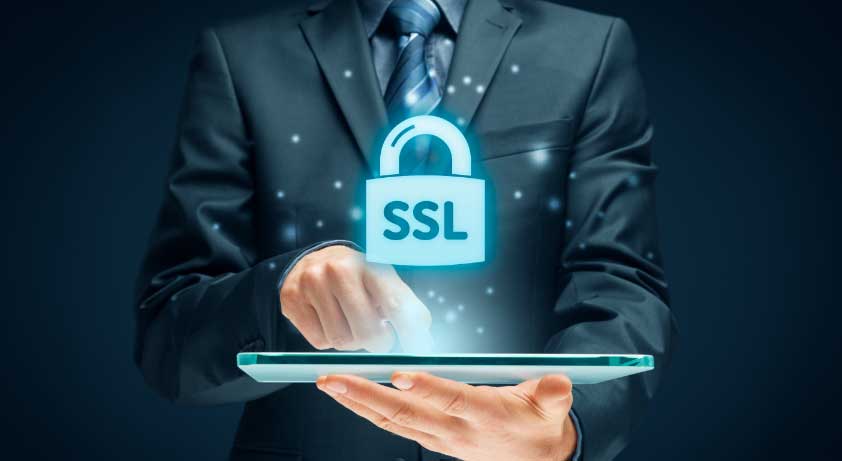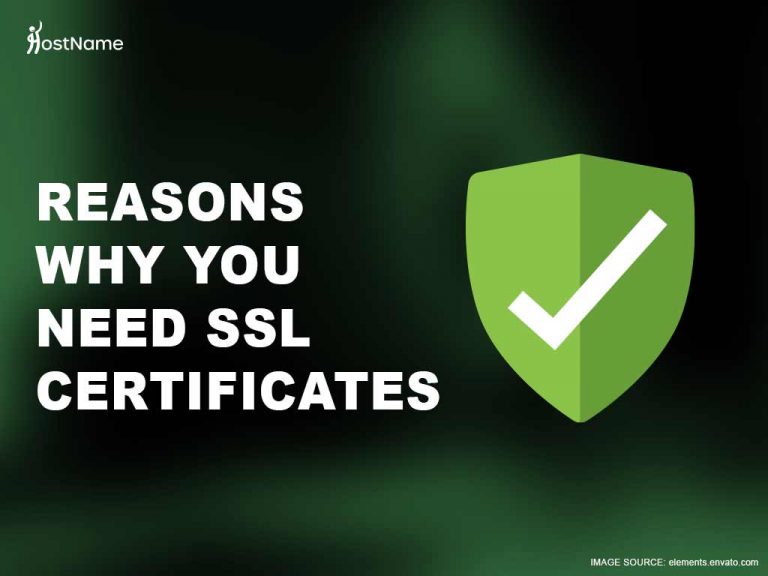You may have heard about or told you need to get SSL Certificates for your website. That may have led to questions about what it is and if it’s really that big of a deal. It is actually a big deal and so we’ve compiled seven reasons why you need SSL Certificates. But before we jump into that, here is a summary of the who, what, when, where, why and how of SSL Certificates.
Table of Contents
What are SSL Certificates?
Encryption provides security to website users. It assures users that their personal data will be protected when they are required to enter it online.
If there is no encryption on a website, anyone from cyber criminals to oppressive governments can gain access to your private information and use it to do just about anything they want. Nobody wants to deal with that, which is why encryption is so important. But, what does this have to do with SSL Certificates?
They are the means by which websites are encrypted.
Secure Sockets Layer Certificates better known as SSL Certificates verify your website and encrypt or lock information sent to a server. They secure all the sensitive information sent across the internet and ensure only the intended receiver sees it, by triggering the padlock and the https protocol on your browser. learn more about SSL certs here.
SSL Certs fall into three categories
1. Extended Validation SSL Cert
There are three types of SSL Certificates and deciding which is best for your website depends on the use and purpose of your website. For example, if you’re a financial institution, corporation or any other type of business that collects users’ sensitive information, the Extended Validation (EV SSL) Certificate is recommended. This type of certificate is best suited for these sites, because it’s the easiest to recognize and provides the highest level of security.
2. Domain Validated SSL Certificate
Businesses on the smaller to medium size, that don’t handle sensitive data, but want to secure their sites, can opt for the Domain Validated (DV SSL) Certificates. It is less expensive and the application process is fairly simple. All you have to do is prove that you own the website for which you’re applying for the certificate, through a simple email validation process.
3. Organization Validated Certificate
The Organization Validated (OV SSL) is the other type of certificate. It’s recommended for best for governments, companies and any other business looking to add some extra security to their websites.
Now that you have a better understanding of what SSL Certificates are, the different types and which one is best for your website, we’ll look at seven reasons you need them.
Why do you need SSL Certificates?

As we mentioned earlier, SSL certificates offer an extra layer of website security with tough encryption. The types of SSL certificates that exist provides varying levels of data encryption, vital for secure online communication. Let’s have a closer look at the benefits of using SSL certs.
1. They provide authentication
Because things are not always what they appear to be, a server can pose as yours and steal your users’ information. But with SSL Certificates you are the visitors to your website don’t have to always worry about that. SSL authenticates your website, by proving to users that you are who you say you are.
2. Enhanced security
While the presence of an SSL certificate on your websites does not mean cyber criminals will not try to hack into them and steal information. These enhanced security provided by the certificates block those efforts. An SSL Certificate makes your site HTTPS, which means it ensures your organization’s and users’ security and privacy are protected.
3. Stops data from being intercepted
When information is submitted on a website, before it reaches the intended receiver, it usually goes through a channel of computers. This means the chances of the information being stolen along the way are higher if SSL is not applied.
SSL reduces the risk by encrypting the data, so it is seen only by those the sender wants to. To make this possible, SSL adds random characters to the sender’s information. Once this is done, the information can only be accessed by those with an encryption key. The data is therefore unreadable and therefore useless to everyone else. Use this website security checklist to help reinforce your cyber-security strategy.
4. Gives users a Sense of Security
The prevalence of cyber crimes, including scamming and identity theft, brings the need for information security into focus.
Websites that installs SSL certificates are ensuring users’ information is safe. This builds people’s trust and confidence in the business, which means they are more likely to do their online transactions without fear, resulting in improved conversion rate and sales later on.
5. Essential for Google ranking
Website trustworthiness is a major factor in Google rankings and these days, organizations focus a lot of their budget and time on standings. Using SSL Certificates is a sure head start in this area.
Google, through its HTTPS everywhere initiative, gives websites with encrypted connections an automatic boost in status. The boost isn’t major, but it gives you an edge over competitors who don’t have certificates.
6. A Necessity for Online Payments

The finance industry, for example, asks businesses to maintain a basic level of security. The Payment Card Industry has its rules too. It requires that all websites accepting credit card and other sensitive information must use an SSL certificate.
Simply put, if you collect money on your website, purchasing an SSL certificate is not an option. You must have one installed.
7. It’s Mandatory
Encryption leads to greater security and this is so important, that there are laws to regulate it. However, the rules may be different based on the industry within which you operate. The finance industry, mentioned above, have their set of rules. Healthcare providers and institutions of higher learning also have theirs.
Google has its own too. In July 2018, Google launched a feature in its Chrome browser that marks websites without SSL certificate as “not secure”. This is part of its efforts to ensure safer browsing.
If you choose to operate without SSL Certification, Google will tell everyone who tries to access your website that it is not secure, which is the telltale sign to back away and visit another website. The absence of an SSL Certificate will send established and potential clients to your competitors, which can negatively impact your bottom-line.
Summary
It is hard work creating and maintaining an online presence, but that can become much harder if you do not have an SSL Certificate on your website. Doing so puts you and the visitors to your website at risk to be scammed, have their identities and other sensitive information stolen.
It is said that, it is better to be late than to be sorry. So, if you haven’t installed one yet, now is the best time to do so.






